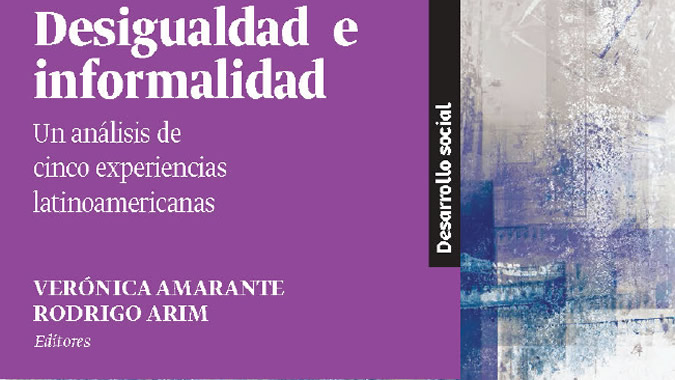Greater Labor Formality and Education Are Key to Reducing Inequality
Work area(s)
Topic(s)
A new book by ECLAC analyzes the relationship between these factors in five Latin American countries.

Starting in 2002 inequality levels declined significantly in most Latin American countries. This good news was due largely to progress made in the labor market, especially in the formalization of employment, as well as to higher education levels, according to a new publication by the Economic Commission for Latin America and the Caribbean (ECLAC).
The book entitled Inequality and Informality: An Analysis of Five Latin American Experiences (in Spanish only) —published in conjunction with the Norwegian Ministry of Foreign Affairs and coordinated by Verónica Amarante, Director of ECLAC’s Office in Montevideo— analyzes the links between the reduction of income inequality and the process of labor formalization that has taken place in five of the region’s countries (Argentina, Brazil, Chile, Ecuador and Uruguay) during the first years of the 21st century.
Although the publication indicates that this is a complex issue and it is necessary to address the various aspects that enabled inequality reduction in the countries under study, it also recognizes that the formalization of employment (which is to say, jobs with social security) fosters greater dynamism in the income of workers located on the lower rungs of distribution.
Additionally, the publication adds that beyond each country’s particularities, the rise in registered labor not only has allowed a larger group of workers to access social benefits and be protected by labor institutions, but it also has had a deconcentrating effect on labor income.
The book concludes that labor formalization and the set of regulations and institutional mechanisms that govern wage formation in the formal sector, as well as the returns on education and the changes in workers’ educational levels, have played a relevant role in reducing inequality during the first decade of the 21st century, although there are considerable differences among countries.
According to the results of the research, the fall in the Gini index—used internationally to measure inequality—ranges from 2.8 points in Argentina to 9 points in Uruguay. In addition, in all the countries, with the exception of Chile, the total deconcentrating effect of formalization is higher than that of education.
In Brazil, Ecuador and Uruguay, the reduction of informality was greater and had a bigger impact on the decline in inequality (approximately three points of the Gini index in the three cases). Meanwhile, the narrowing of the salary gap between formal and informal sectors had an inverse (concentrating) effect in Chile, while in Ecuador, Uruguay and Argentina it served to reduce inequality.
The publication concludes that the cases analyzed show a rich and complex scenario with regard to inequality. Although the returns on education play a central role in reducing distribution gaps, institutional processes linked to the increasing formalization of the job market explain the big salary increase for workers on the lower rungs that has been observed in recent years.
Thus it is necessary to consider labor formality as a key channel for public policy action oriented towards overcoming restrictions on growth and equality, the document states.
Related content
Subregional headquarter(s) and office(s)
Type
Country(ies)
- Latin America and the Caribbean
Related link(s)
Contact
Public Information Unit
- prensa@cepal.org
- (56 2) 2210 2040